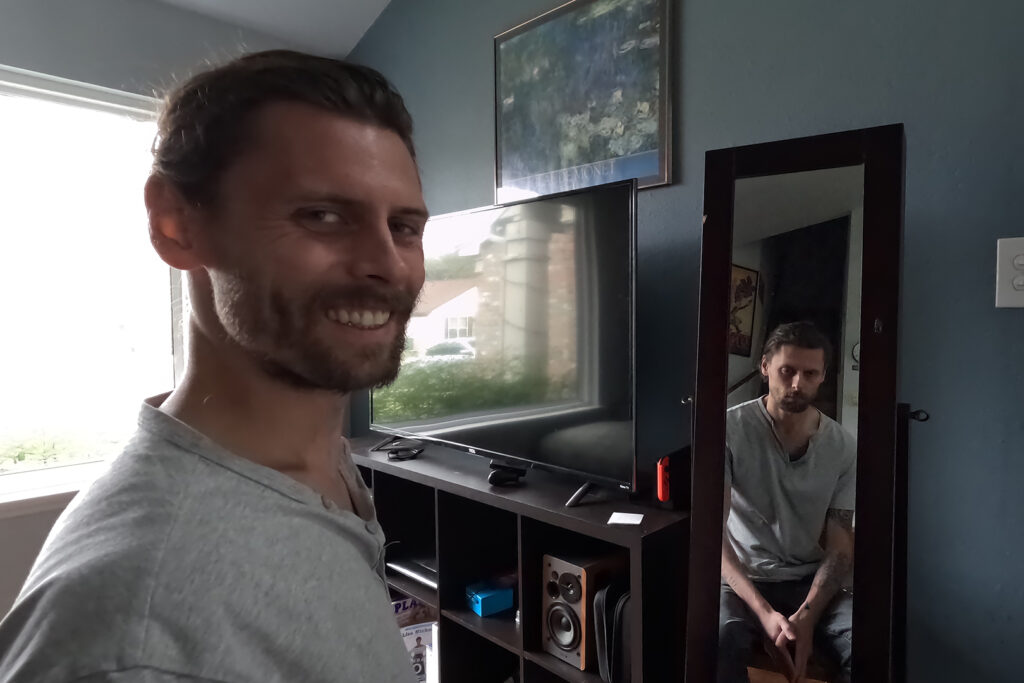Everyone has a shadow: A neglected part of themselves that never sees the light of awareness.
This shadow might take the form of the insecure beta male that you strive to oppress. After all those years of being bullied, no. You’d never let anyone take advantage of you again. You’re a big strong man who has a lot to show, and that’s the image you would die to uphold.
Maybe it’s the drug-addicted loser you avoid looking at in the mirror. Or the abhorrent whore, the shame to your family, the person who became a disastrous failure in life. So you work your ass off and flaunt your self-worth to make sure you never touch that image with a ten-foot pole.
But that pathetic, ugly, painful version of you still exists. They’re still a part of you. They’ve just been banished from your awareness and locked in the dark basement of your subconscious.
This shadow hasn’t been resolved, it hasn’t been healed. It has just been exiled, but it’s more a part of you than ever.
So it’s time to confront that shadow. It’s time to integrate and heal. But you can’t do that without looking into those places you don’t dare to go.
This is what shadow work prompts are for. They’re cues to help you confront the neglected parts of yourself so you can work on the issue rather than just avoiding it.
The importance of confronting your shadows

Your shadows come in the form of past traumas and unresolved wounds that have never properly been dealt with. Instead of healing the root cause, you slapped on a persona and pretended to be someone you’re not in an attempt to cover up your ugly side.
After all, this is the quicker solution. At least it feels like a solution, for a while. But if you’re looking to heal, grow, and truly become your best self, you need to be genuine.
This dark icky mess that you locked in the closet manifests into insecurities, distorted perceptions about reality and oneself, limiting belief systems, and a whole mountain of trash that really does not serve you.
This manifestation is the shadow self – the broken, dysfunctional side of you. A portrait of your lower self.
The shadow self cannot be abandoned. Neglecting it just adds more fuel to the fire. Despising it just makes you despise yourself. The shadow self is a disintegrated part of who you are, but it’s still a part of yourself, so it should be treated as such.
Acknowledging your shadows is one part of the equation, but integrating them is another. This is where these shadow work prompts can help you ask the real questions, and act as a launchpad to create deep healing within yourself.
To learn more about the process of shadow work and what it is, follow the link below. To go straight to the prompts, continue reading.
What are shadow work prompts?

Shadow work prompts cues that are intended to make you question certain things about yourself, to bring you awareness to a hidden dysfunction, or shadow.
If I were to ask you why a particular conversation triggered you, or why you keep making the same mistakes in your romantic relationships, these questions might open a can of worms.
Below are a series of questions that are intended to help you introspect, and dive into the part of your unconscious mind that rarely see the light of day.
Don’t take a half-assed approach, but read each prompt and think about the questions. Observe if any buried feelings come up, if they trigger certain memories, or if these powerful cues flush anything to the surface that is worth investigating.
If a shadow work prompt does trigger a reaction, that means you’ve hit gold. Sit with whatever comes up and be present with the thoughts, emotions, and memories. Feel everything painful that surfaces until the emotions begin to lose power. This is how healing takes place, by allowing yourself to experience the discomfort and process it. Not by distracting yourself and escaping it.
If you hit a resonating chord, it might take you many times to get to a point where you no longer feel triggered by the thought or feeling. If that’s the case, think about the particular prompt whenever you can and each time you do, you’ll heal a little more.
The problem with avoidance
It’s easier to pretend your problems don’t exist than to put in the hard yards and do the healing.
Healing is a painful process. It’s confronting. It can make you feel small. creating an image is a quicker solution, and it’s usually the obvious solution too.
Think about it. If you felt like you were a loser growing up, it’s easier to learn how to be cool and wear that image than to confront why you feel like a loser. And you can actually fool yourself pretty well too.
Likewise, if you’re generally a negative person, it’s easier to create a facade of love and light than to dig into why you see so much darkness within yourself.
Genuine healing is not straightforward. It can be a long journey just to figure out what needs to be healed, let alone how to heal it. So people tend to heal on the surface level but neglect the real stuff.
This will inevitably cause more problems in the long run because the issue hasn’t been solved. We have created an incredibly superficial society where people believe that healing is skin deep, and live behind a facade of their higher self, rather than their higher self.
This is called spiritual bypassing, and it’s very important to acknowledge. You must be genuine with your process of healing if you actually want to heal.
So when we get into these shadow work prompts, keep this in mind.
The importance of self-reflection

Self-reflection is a critical aspect of shadow work. It’s the process of examining your thoughts, feelings, and behaviors to gain insight into yourself – where you can then apply the appropriate behavioral changes.
Self-reflection helps you to identify your triggers, discover reoccurring patterns, and discard limiting belief systems. It’s also a way to connect with your inner self, listen to your intuition, and gain a deeper understanding of your values and desires.
When reading the following shadow work prompts, it’s important to be honest with yourself. After all, you’re here for a reason, and some of these prompts might make you feel a bit tender… or perhaps cause some sort of emotional reaction.
So do the work, as that is what will give you results in the long run. Continue reading for the shadow work prompts. Otherwise, here is a useful resource.
Shadow work prompts

Some of these topics might not apply to you. Others you’ll find hit a resonating chord and really make you think. Pick out the shadow work prompts that resonate with you, and really start working on them.
When you read each cue, do the following to start integrating your shadow.
- Reflect on the question
- Think about any associated memories that come up
- Identify if any uncomfortable feelings are triggered and acknowledge that wounded version of you
- Sit with those feelings
- Visualize yourself helping that wounded version of you, and bringing him/her into yourself
What are some of the reoccurring patterns in your life?
Think about painful events that seem to repeatedly occur in your life. Do you have a pattern of getting into relationships with narcissists? Do you always seem to get caught in bad situations, or get taken advantage of? Is it just the workplace you’re at that you don’t get along with people, or is it all workplaces?
Think about negative trends in your life that you haven’t yet overcome. Explore why YOU keep attracting those painful experiences into your life, and think about what you can do differently to make sure the same occurrence doesn’t happen again.
What are your triggers?
Identifying your triggers is an essential step in shadow work. Triggers are events, situations, or people that really get on your nerves, usually for an unknown reason. They cause a disproportionate emotional reaction. By identifying your triggers, you can start to understand the underlying emotions that are driving your reactions.
To identify your triggers, take some time to reflect on the situations that have caused you to feel a certain way in the past. Maybe you lashed out or became overly defensive when it wasn’t warranted. Perhaps a certain situation made you shut down or become resentful.
Think about what really gets on your nerves, and what you hate when people do it. Write down the emotions that you experienced and try to identify the root cause of those emotions. Once you’ve identified your triggers, you can start to work on healing those underlying emotions.
Do you project your own insecurities onto other people?
You know when people use you as a scapegoat and dump their issues onto you? Then they won’t listen to reason and make it out that you’re the bad guy? That’s projecting – pushing your own emotions onto a victim so that you’re not at fault.
We all do this at times because it’s easier to defer responsibility for our flaws than to take radical self-responsibility and heal the root cause of those wounds. Do you ever find yourself projecting, or blaming someone when it wasn’t their fault?
What are your biggest regrets?
Is there something you regret and have a hard time thinking about it? Maybe it’s that time in high school when you didn’t stand up for yourself. Perhaps you cringe when you think back to that date that went horribly wrong.
If you have a hard time thinking about a particular memory, it means that you still have a wound. The only way to clean it is to spend time being present with those memories where you can process them, forgive yourself for making the decisions you did, and realize that you’re human.
So moving forward, here are some things to think about.
-
- Is there anything that still makes you cringe when you think about it?
-
- Are there memories, experiences, or decisions that you’re not comfortable feeling?
-
- What could you have done differently knowing what you know now?
-
- Why do you think you regret these experiences in the first place?
If something went wrong recently, what could you do better next time?
Part of the game of life is that things go wrong all the time. Maybe it’s an accident, injury, argument, screwing up at work or in your relationship. It’s normal to make mistakes sometimes, but acknowledging those mistakes and learning from them is the game changer here.
If anything happened recently that didn’t go so well, reflect on what you could have done to create a different outcome. Here are some things to think about. Below is an article that goes much deeper into this phenomenon.
Learn more about empowering yourself in the article below. Otherwise, here are some shadow work prompts to think about.
-
- What caused the mistake to happen in the first place?
-
- How do you feel about the mistake?
-
- What would you do differently last time?
How do you see yourself in your own eyes?
Are you someone you’re proud of, or do you wish you would have gotten further by this point? Your image of yourself tells you a lot. If you feel like you’re not who you want to be by now, this shows you that you’re probably running from something. So the point here is to find what aspect of yourself you dislike and learn to accept it for what it is.
-
- What aspects of yourself do you dislike?
-
- Why do you dislike that particular aspect of yourself?
-
- How does it make you feel?
-
- What can you do to integrate that aspect of yourself?
-
- How can you learn to accept yourself for who you are?
How often do you lie, or cover up truths?
Covering up truths and telling lies indicates that you have something to hide. And why do you have something to hide? Well, you really gotta ask yourself about that…
Maybe you’re ashamed of something you did and don’t want people to know. Perhaps it’s guilt, and you feel like people would judge you if they knew. Whatever it is, there are negative feelings beneath the surface, otherwise, you would have no intention of covering up the truth – either to yourself or other people.
So really look into your tendency to lie, and try to figure out where this need comes from.
-
- How often do you say things that aren’t necessarily true to feel better about yourself?
-
- What sort of reactions are you trying to avoid from other people?
-
- How would these reactions make you feel if you told the truth?
-
- Why do you care what other people think of you?
-
- What is so important about being accepted by other people?
What aspects of your parents do you see in yourself?
What sort of beliefs do you share with your parents? Are your beliefs really your own, or something you’ve adopted? The reason I ask is because we tend to take on aspects of our parent’s personalities, perceptions, and beliefs that may not serve us.
Most people adopt a lot of beliefs, attitudes, and different things from their parents, and this can ‘replace’ who you actually are and what you actually want to do. So look at what commonalities you share with your parents, and if they’re really in your best interest.
-
- Do you have similar beliefs to your parents? Are they beneficial for your growth and happiness?
-
- Do you find yourself behaving in similar ways to your parents?
-
- Are there any dysfunctions that you may have adopted, and believe it’s normal?
-
- Were your parents a good influence on you as a child?
How often do you make excuses?
The unconscious tendency to avoid looking at yourself is a sign that there’s something to be found. Often there’s a good reason why you make excuses for doing things that you should be doing.
Why? Because there is some sort of avoidance happening there. And sometimes that avoidance comes from fear, self-worth, insecurities, shyness, etc. Whatever it is, it’s probably not good, so it’s important to have a hard look at why you are avoiding certain things in your life.
-
- Do you find there’s resistance for you to work on yourself?
-
- Do you make excuses not to see friends or family?
-
- How often do you put off invitations to new opportunities?
-
- Do you procrastinate a lot?
-
- How often do you look for excuses for the things you really should be doing?
-
- Why do you think you avoid working on yourself or improving your life?
What's preventing you from being your authentic self?
Embracing your authentic self is the ultimate goal of shadow work. It’s about accepting yourself fully, flaws and all, and living a life that’s true to your values.
People often hide their true colors for fear of being judged. Do you mask your true identity out of fear of being seen, or are you completely comfortable in your own skin?
To embrace your authentic self, take some time to reflect on who you are at your core. Write down the things that make you unique and special. Then, start to make choices that align with your values and desires.
-
- What does your authentic self look like?
-
- If you could be anyone, what would this person look like?
-
- What are your highest values that fill you will joy?
-
- Why are you being someone who you don’t want to be?
-
- What characteristics, traits, skills, and abilities do you need to develop to be in alignment with who you want to be?
-
- What is preventing you from showing your true colors?
-
- How would it make you feel if people saw you for who you authentically are?
Do you have a bigger ego than most?
An inflated ego is usually a sign of overcompensating for something you’re insecure about. So see whether your ego is in check by reading the following prompts. If you find that your ego is more inflated than it should be, take steps to balance it by following the link below.
-
- Do you tend to boast?
-
- Do you tend to look for validation or approval?
-
- Do you have a superiority complex, and think you’re ‘better’ than other people?
-
- Do you talk about yourself a lot?
-
- Are you always the center of attention?
-
- Do you get triggered when people talk down to you or treat you in a way that doesn’t live up to your self-image?
What are some of the biggest challenges you had during childhood?
Trauma often comes from childhood, which is why it’s important to reflect on your childhood and feel out if something really hurt you. These imprints can stay with you for a long time, and turn into a distorted mess if neglected.
The best way to see if you have childhood trauma is to probe your memories. If the memory is sensitive and brings up an emotional response, there’s probably an unhealed trauma there, so look into it. Here are some things you can feel into.
-
- Arguments, conflicts, or abuses with your family
-
- Being picked on or bullied
-
- Was there something disturbing you witnessed?
-
- Is there anything super embarrassing that happened?
-
- Did something happen to really scare you at some point?
-
- Can you remember times when you felt distressed?
How do you respond to constructive criticism?
Do you usually get upset when someone gives you constructive feedback, or do you welcome it? Perhaps you get defensive or think people are deliberately trying to take you down when they’re actually just trying to help. So what does this say about you?
If constructive criticism hits a sore spot, think about why you take it so hard. Why do you feel like you need to be good at everything, and that you can’t take advice from other people without getting triggered? What do you think causes this?
Do you often self-sabotage?
Self-sabotage is when you unconsciously prevent yourself from getting something you want because you believe you don’t deserve it. It really boils down to a self-worth issue.
Sometimes people sabotage good job opportunities, and relationships, and unconsciously push away things that are good for them. Usually, they don’t know that they’re self-sabotaging, but they do things they normally wouldn’t, perhaps say things or behave in a way that they know is not going to be in their best interest, but they do it anyway.
So look into whether you notice trends where you sabotage good things that are coming into your life. It’s important to acknowledge what was in your control, why you sabotaged yourself, and how you can make sure it doesn’t happen again.
-
- Have you ever ruined a good job opportunity?
-
- Have you messed up a good blooming relationship?
-
- How often do you reject help, when it could actually really help?
-
- Do you tend to deny good things that are coming into your life like money, people, opportunities, and adventures?
What are your core beliefs?
Core beliefs are the fundamental beliefs that you hold about yourself, others, and the world around you. They’re often formed during childhood when our minds are squishy and impressionable – and become deeply rooted in who we are.
Negative core beliefs can hold you back and lead to negative patterns in your life. Therefore, take some time to reflect on the beliefs that you hold, and really think about whether they’re in your best interest.
Write these beliefs down and try to identify where they came from. Are they serving you, or are they holding you back? If they are holding you back, start to challenge them and replace them with more positive beliefs.
-
- What are your beliefs about people in general? Are they greedy, evil, or only out for themselves?
-
- Are people inherently good or bad? Why do you think so?
-
- Is the world a good place to live?
-
- Is society getting better or worse?
-
- Is humanity going in a good direction? If not, can it get better?
-
- Are you a good person?
-
- Do people like you?
-
- Do you have a lot to offer the world?
What aspect of your personality are you most insecure about?
Comparison plays a big role in being insecure. You’re weighing yourself up to other people and think you have something you need to prove. If there’s something you don’t like about yourself, such as your job, the people you associate with, or the things you do, this shows you that you are insecure about certain things and that those parts of you need healing.
So really have a look at all areas of your life. Are you insecure about any aspect of your life? Maybe you’re a mess and feel like your life is falling apart, in which case a lot of work needs to be done. What are you insecure about, why do you feel insecure about it? Below are some things to look at.
-
- Your physical appearance
-
- Your ethnicity or race
-
- Your sexual orientation
-
- Your career
-
- Your living situation
-
- How much money you make
-
- Your partner
-
- Your social skills
-
- Your dating life
-
- Your intelligence
-
- Your beliefs
What is something that someone says or does that you tend to take personally?
Do you often take things personally? If you tend to take some things personally, and not others, it means people are hitting on a sore point – and you should do some digging to figure out what it is, and why it hurts.
In what sort of situations do you feel most vulnerable?
If you have no hidden wounds, you probably feel pretty self-assured. But it’s pretty normal to feel vulnerable at times and in specific areas of our lives. Job interview, moving to a new place, parties, dates. Think about it.
When do you feel most out of your element? When you feel like you’re not in control of the situation? How does this make you feel? Look at why certain situations make you feel more vulnerable, and where that feeling of vulnerability comes from.
If the perceived reality seems disproportionate to the actual potential consequences, there’s probably something there that needs looking at.
-
- Interviews
-
- Meetings
-
- Social settings
-
- Dates
-
- The Workplace
-
- Traveling
-
- Being alone
-
- When you don’t feel in control of a situation
How do you think other people think of you?
Looking at yourself through a 3rd person perspective can give you some… perspective. Because if you think everyone dislikes you, or thinks you’re a loser, you’re probably projecting those feelings when it could be far from the truth.
Therefore, look at yourself through the eyes of other people. Also, think about what would annoy you the most about yourself if you were interacting with yourself. This is a good way to get a different perspective into who you are, and where your biggest faults are.
What are you most ashamed of?
Shame is often a root cause for repressing a part of yourself. If you’re ashamed of something, or someone made you feel a certain way about something you did, you are likely to reject that aspect of yourself.
So think about whether there’s anything you’re ashamed of. What is it, and why are you ashamed of it? How can you take steps to let go of that shame and heal?
Are there any aspects of yourself that you're embarrassed by?
Have you ever thought of a particular memory, or even a hypothetical situation and you feel the same physical manifestations as if it actually happened? Maybe your face starts going red, you start heating up, and you begin perspiring.
Guess what? That means you’re discovering a wounded root that is causing these emotional reactions because you – or other people are hitting on a pain point. If an action, behavior, or something you do causes you to be embarrassed, there’s probably a deeper reason behind it. If you were completely healed, you wouldn’t feel embarrassed.
Think of something you could do, or something that could happen that would embarrass you. Dig into your past and think about things that happened that made you feel embarrassed. Why do you think you felt that way instead of being confident and in control of the situation?
Do you feel like you're a victim?
Do you find that you’re constantly taken advantage of by people? Life sucks, everything is against you, poor you. But really, do you feel like the world is against you, that you’re constantly the victim of life? Your family tries to take you down, your friends suck, people at work always blame you, and bad things just happen to you all the time.
So let’s explore this. Do you think this is the objective truth of your reality, or that perhaps you’re seeing the worst in everything? Sometimes we are victims. But if it constantly happens, you’re either attracting it or distorting the reality of the situation to make yourself out as the victim.
Because let me tell you, someone who has had a terrible life can be empowered. Someone who was raped can decide to stop being a victim by healing their trauma and moving on with their life. And I’m sure you can too, so look at why you are always a victim, and what you can do to empower yourself.
What are some trends you notice in your romantic life?
Look into your love life and the trends that seem to occur within it. Toxic partners, narcissists, interdependence, regular arguments, or conflicts. Constantly breaking up and moving to the next thing.
At some point, you have to start pointing the finger at yourself and wonder why the same shit keeps happening. What is causing this behavior? Are you sabotaging yourself or trying to fill an insecurity such as the fear of being alone?
What are some relationship patterns
What sort of dynamics usually play out in your relationships? Have you been in love, have you had your heart broken? You you find that there’s an awkward power balance, or maybe the people you’re with seem vanilla, or you don’t approve of their pasts. Here are some shadow work prompts about your relationships.
- Have you ever had your heart broke? How did it make you feel and affect future relationships?
- Have you had any gay experiences that you’re ashamed of?
- Are you affectionate in your relationships?
- Do you find that you’re needy or overattached?
- Are you distant, avoidant, or don’t like to open up to your partners?
- Do you find that your relationships are lustful, or genuine connections?
- What did your parents believe about love?
- What was your parents relationship like?
In what area of your life you you feel you have a block?
Think about areas where you really struggle and can’t seem to get ahead. Look at what area of your life you struggle in the most, and think about why that is.
For me personally, for a long time, I had a block around getting ahead financially. I would often get robbed, lose money somehow, lose good job opportunities, and this happened like clockwork. It took time to figure out that there was a deeper issue. I felt I didn’t deserve to get ahead financially due to my self-worth issues.
-
- What area of your life do you feel needs the most improvement?
-
- What are some negative reoccurring trends in your life?
-
- In what aspect of your life does the world itself seem to be against you?
Are you overcompensating for anything?
For me, it wasn’t until my mid-twenties that I realized I had an ‘over-nice’ problem. I do pride myself in being a genuinely kind person, but in the past, I would put every person before myself.
So I needed to look into this behavior. When I did, I realized it came from the fear of disapproval – that I felt I needed to be liked and approved of by everyone, as I never really felt it as a kid. Think about if you’re a certain way because you’re overcompensating for something.
Is there someone you haven't yet forgiven?
Forgiveness is a powerful tool in shadow work. Holding onto grudges is draining, and prevents you from moving forward with your life. Forgiveness is a process, and it may take time, but it’s a crucial step in healing and moving forward.
To practice forgiveness, start by forgiving yourself for any mistakes or shortcomings that you may have. Work on forgiving others who may have hurt you in the past.

